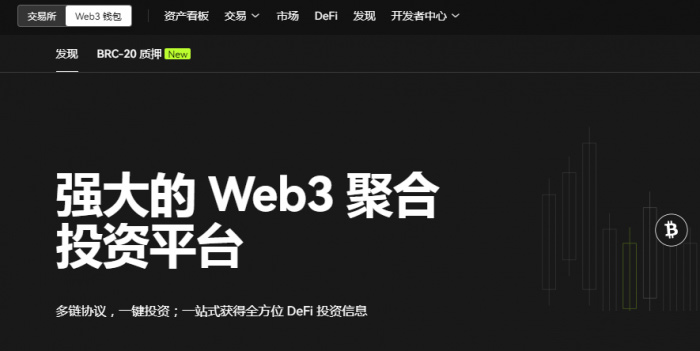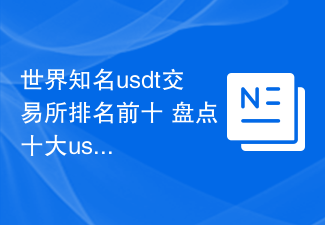 web3.0
web3.0 What is a Perpetual Contract? An introductory tutorial for beginners in Perpetual Contract trading
What is a Perpetual Contract? An introductory tutorial for beginners in Perpetual Contract tradingPerpetual contracts are a type of financial derivative that allow traders to make bets without holding the underlying asset. Similar to traditional futures contracts, but without an expiration date, they can be held indefinitely. Perpetual contract trading involves steps such as opening a position, providing margin, leverage and closing the position. Its advantages include round-the-clock trading, leverage to amplify trade size, and hedging risks. However, there are also risks such as liquidation, market volatility and leverage risk. When newbies get started with perpetual contract trading, they should research the market, choose a reputable exchange, start small, manage risks, and maintain patience and self-discipline.

Perpetual Contract: Getting Started
1. What is a Perpetual Contract?
Perpetual contracts are a type of financial derivative that allow traders to bet on the underlying asset without owning it. It is similar to a traditional futures contract, but has no expiration date, so it can be held indefinitely.
2. How perpetual contract trading works
Perpetual contract trading involves the following steps:
- Opening a position:Determine your trading direction (buy or sell) and place your order.
- Margin: Provides a margin for your trade, usually related to a percentage of the contract value.
- Leverage: Use leverage to magnify your potential profits, but remember that it also increases your risk of loss.
- Position: You can hold the perpetual contract indefinitely until the position is closed or liquidated.
- Closing: Close your contract by placing a trade in the opposite direction of your opening trade.
3. Advantages of Perpetual Contract Trading
- 24/7 Trading: Perpetual Contract Market 24/7 Open hours, offering flexible trading hours.
- Leverage: Leverage allows you to make larger trades with smaller capital.
- Hedging risk: You can use perpetual contracts to hedge your position in the spot market.
4. Risks of Perpetual Contract Trading
- Liquidation: If your margin is below a certain level, you The position may be liquidated, resulting in the loss of the entire margin.
- Market Volatility: The perpetual contract market can be very volatile, resulting in rapid price changes.
- Leverage Risk: Leverage can amplify your losses, so use it with caution.
5. Beginner’s Guide
- Understand the market: Study the operation and risks of perpetual contracts.
- Choose an exchange: Choose a reputable exchange that offers adequate liquidity and low fees.
- Start Small: Trade using small positions until you have a better understanding of the market.
- Manage risk: Set stop-loss and take-profit orders to limit your losses and lock in your profits respectively.
- Patience and self-discipline: Perpetual contract trading requires patience and self-discipline. Avoid emotional trading and develop a trading plan.
The above is the detailed content of What is a Perpetual Contract? An introductory tutorial for beginners in Perpetual Contract trading. For more information, please follow other related articles on the PHP Chinese website!
 如何将虚拟货币从web3钱包转移到交易所?Jan 19, 2024 pm 03:18 PM
如何将虚拟货币从web3钱包转移到交易所?Jan 19, 2024 pm 03:18 PM步骤一:选择合适的交易所在进行Web3钱包转币操作之前,首先需要选择一个可靠的数字货币交易所。建议选择那些用户口碑较好、提供安全稳定的交易平台,并且支持Web3钱包的连接。您可以进行一些市场调研,选择最适合您的交易所,例如欧易和币安等知名交易所。这些交易所在业界享有良好的声誉,并提供高度安全的交易环境,能够满足您的需求。步骤二:下载并注册Web3钱包在进行转币操作之前,您需要先下载并注册一个Web3钱包应用程序。目前市面上有多种可选的Web3钱包,如Imtoken、tokenpocket、欧易的
 Bitget交易所怎么充值?Bitget交易所充值及充币图文操作教程Jan 31, 2024 pm 12:18 PM
Bitget交易所怎么充值?Bitget交易所充值及充币图文操作教程Jan 31, 2024 pm 12:18 PM说起Bitget交易所想必各位投资者都不陌生,它凭借成交量大、深度好、盘口差价小等优势,赢得了大批忠实用户的入驻,近年Bitget交易所陆续上线了多种新型的交易功能:包括闪电开平仓、止盈止损、阶梯强平等,目的是为了给用户提供更加优质的交易体验,这也赢得了不少用户口碑。在投资者使用交易所时,不管是新手小白还是资深投资者都会面临充值问题,那在使用Bitget怎么充值?下面小编就来为大家详细介绍一下,带大家一文学会Bitget交易所充值及充币流程。Bitget怎么充值?Bitget交易所的充值及充币流
 新币上线前如何买到开盘价?真的能买到吗?Jan 31, 2024 pm 03:06 PM
新币上线前如何买到开盘价?真的能买到吗?Jan 31, 2024 pm 03:06 PM在加密货币市场,每当一种新的代币即将上线交易所时,投资者往往急切地寻求在开盘价购买,以期望从初始涨幅中获利,深受大家关注的问题,由于市场的高度竞争和涨跌波动的不确定性,许多投资者不禁对新币上线前真的能买到开盘价吗?产生疑问。新币上线前如何买到开盘价?在数字货币市场上,投资者可以通过提前准备、搜集信息、制定计划以及选择合适的交易所等方式来增加购买新币开盘价的机会。以下是一些可能帮助投资者达到这一目标的方法:1.提前准备好数字货币交易账户要在新币上线时最快买进的方法,首先需要提前准备好数字货币交易账
 世界十大USDT交易所哪个正规?盘点10大靠谱USDT购买平台Jan 31, 2024 am 08:21 AM
世界十大USDT交易所哪个正规?盘点10大靠谱USDT购买平台Jan 31, 2024 am 08:21 AMUSDT作为一种备受关注的稳定货币,随着区块链技术的发展和加密货币市场的普及,逐渐占据了市场份额。但是在众多的usdt购买平台中,我们如何才能找到真正可靠、正规的交易所呢?以下是全球十大可靠usdt购买平台的盘点。盘点10大靠谱USDT购买平台1.OKx欧易OKEx是一家领先的数字资产交易平台,也是购买USDT的可靠选择。它提供了全面的交易功能和多样化的交易选择,并采取了多种安全措施来保护用户的资金和交易安全。通过OKEx购买USDT,用户可以享受高效、安全的交易体验。欧易OKX是全球领先的数字
 稳定可靠的虚拟币交易所推荐,比特币定投平台有哪些?Jan 31, 2024 pm 01:57 PM
稳定可靠的虚拟币交易所推荐,比特币定投平台有哪些?Jan 31, 2024 pm 01:57 PM哪里可以做比特币定投,推荐一个稳定可靠的虚拟币交易所,比特币做为虚拟币的龙头,一直引领着虚拟币进入一个新的时代,从刚开始出现的无人问津,很多人不相信,到现在不断的以涨服人,经历了多重的打压,还是屹立不倒,可以说比特币就像一个神话故事,不能深入研究,一旦深入研究它,就会为比特币的历史而着迷,如果你要定投虚拟币,那么比特币是必选的,做为一位币圈的老韭菜,下面给想做比特币定投的朋友,推荐一个稳定可靠的交易平台。我现在一直在gate交易所定投比特币,gate交易所中文名是芝麻开门,芝麻开门的意思让我们进
 HOO交易所可以提现USDT吗?提现流程步骤是怎样的?Jan 30, 2024 pm 08:42 PM
HOO交易所可以提现USDT吗?提现流程步骤是怎样的?Jan 30, 2024 pm 08:42 PMHOO交易所备受关注,尤其是其USDT提现功能。以下将从多个角度分析HOO交易所提现流程步骤。什么是HOO交易所?HOO交易所是一个创新的加密货币交易平台,提供多样化的数字资产交易服务。作为一个知名的交易所,HOO以其高效的交易执行和丰富的交易品种而备受用户青睐。HOO交易所是否支持USDT提现?HOO交易所允许用户将持有的USDT提现至其他钱包地址或平台,从而实现USDT资金的转移。这一功能使得用户可以将USDT转换为其他货币或进行其他交易操作。HOO交易所USDT提现流程步骤第一步:登录账户
 世界知名usdt交易所排名前十 盘点十大usdt交易所Jan 31, 2024 am 08:03 AM
世界知名usdt交易所排名前十 盘点十大usdt交易所Jan 31, 2024 am 08:03 AM世界知名USDT交易所排名前十USDT(Tether)是一种基于比特币区块链技术的数字货币,与美元挂钩,被广泛应用于加密货币交易。USDT交易所是提供USDT交易服务的平台,随着加密货币市场的不断发展,各国涌现了许多知名的USDT交易所。本文将盘点并深度分析全球排名前十的USDT交易所。1.币安(Binance)币安是全球最大的USDT交易所,也是市值最高的加密货币交易所之一。成立于2017年的币安,凭借强大的技术支持、丰富的交易品种和良好的用户体验,迅速成为行业领军者。币安拥有全球用户基础,提
 USDT属于什么币种深度解析Jan 30, 2024 pm 02:13 PM
USDT属于什么币种深度解析Jan 30, 2024 pm 02:13 PM全称为Tether(泰达币)。是一种基于区块链技术的数字加密货币,也是一种稳定币。其特点是与法定货币美元一比一挂钩,即每枚USDT币的价值与1美元等值。

Hot AI Tools

Undresser.AI Undress
AI-powered app for creating realistic nude photos

AI Clothes Remover
Online AI tool for removing clothes from photos.

Undress AI Tool
Undress images for free

Clothoff.io
AI clothes remover

AI Hentai Generator
Generate AI Hentai for free.

Hot Article

Hot Tools

Safe Exam Browser
Safe Exam Browser is a secure browser environment for taking online exams securely. This software turns any computer into a secure workstation. It controls access to any utility and prevents students from using unauthorized resources.

Notepad++7.3.1
Easy-to-use and free code editor

MantisBT
Mantis is an easy-to-deploy web-based defect tracking tool designed to aid in product defect tracking. It requires PHP, MySQL and a web server. Check out our demo and hosting services.

Dreamweaver CS6
Visual web development tools

ZendStudio 13.5.1 Mac
Powerful PHP integrated development environment





